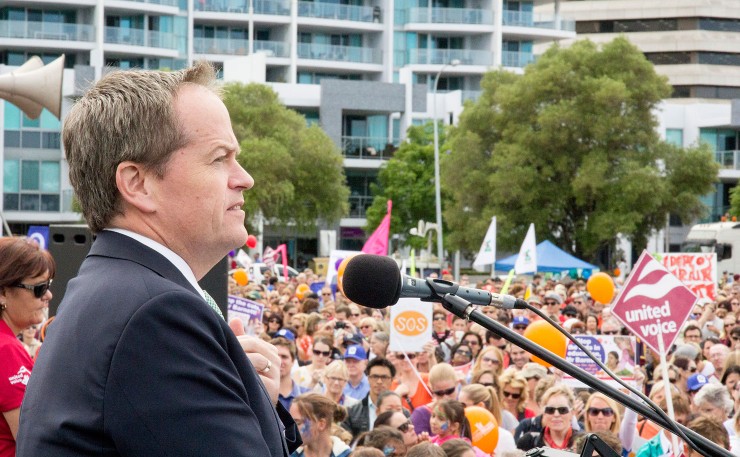With the policy settings finally coming into line with the rhetoric, Labor is well placed to tell a story of inclusive growth, writes Victoria Fielding.
Back in 2013, Waleed Aly summed up the Gillard Labor government’s crisis as one of ideology. Or more specifically, an inability to explain Labor ideology to the voting public. He said: “Voters are not merely electing a suite of set policies. They are electing a party that will respond to future, unforeseen policy questions. They therefore need to know what you’re about. That’s what a clear consistent story tells them.”
During this period, Aly regularly criticised Labor’s missing story. Michelle Grattan, Dennis Glover and Jack the Insider were among the many commentators who discussed Labor’s narrative problems. When Labor were sent into Opposition, talk moved on to the Abbott government’s own missing narrative, and more recently, Turnbull’s narrative woes.
But what a difference three years in Opposition makes. Last month, Aly acknowledged Labor has spent its time out of office productively, and has turned a corner in its search for a worldview. He writes that Labor’s turnaround started with negative gearing concession wind backs, which came on top of superannuation tax loophole changes, and is more recently articulated through calls for a Royal Commission into the banking industry.

Although Aly doesn’t use the word narrative, what he is arguing is that Labor has come out of the communication wilderness and has found their cohesive-narrative-mojo. Aided by what Aly calls an “aligning of stars”, the time is ripe for Labor to articulate an alternative vision by offering policies addressing the resulting public mood. The stars include global dissatisfaction with capitalism due to the Global Financial Crisis, the growing Occupy movement, a heightened understanding of wealth inequality, Abbott’s unfair 2014 budget, and more recently, the Panama Papers leak, which showed the ultra-rich aren’t doing too badly at all, thank you very much.
Lenore Taylor agrees that Labor’s wealth inequality narrative is sound, and further writes that in contrast, “the Turnbull government is losing the economic narrative”.
Aly and Taylor’s position backs up my view that a narrative and a policy platform are not two separate political tools, but are rather a chicken and egg symbiosis, jointly reliant on each other and self-perpetuating, or self-defeating, depending on their mutual strength and cohesion.
So what does an inclusive growth narrative look like for Labor?
With hardly any fanfare (or media coverage), Labor released a policy platform in March which provides them with the appropriate narrative in response to modern problems with market capitalism. Titled Growing Together, the report maps out an agenda where social policies are used not just in conjunction with economic policies, but rather as economic policies, to grow the economic pie larger for everyone’s benefit. This report was developed by Jenny Macklin, Labor Shadow Minister for Families and Payments and Disability Reform, who identified the need for a new narrative after Labor’s 2013 election loss.
With the single-minded aim of inclusive growth, the policies outlined in Growing Together involve targeted government interventions in the market which don’t just lend help, or secure a safety net for the most vulnerable in society, but also drive growth as the economy transitions to an uncertain future.
The characters in this narrative should start to become familiar to the electorate during Labor’s election campaign, selling this refreshed worldview to the electorate. The victim is everyone, except perhaps the richest one per cent. The key to the success of this victim frame is Labor’s ability to convince voters that their policies are not just beneficial to those who directly benefit from them – such as the unemployed receiving a higher Newstart Allowance. Instead, Labor needs to explain that everyone is a victim of growing wealth inequality. This includes business owners who rely on strong consumer spending, young people wanting to enter the property market and looking for sustainable employment, retirees dependent on their superannuation share portfolios for a comfortable retirement, and everyone in between.
The villain in this story is the opposite of inclusive social policy, and incidentally a key pillar of unfettered market capitalism, whose failures make this story all the more timely: rent seeking, greed and anti-social individualism. Such behaviours are optimised by large corporations dodging tax, breaking their social contract with ordinary tax-payers. Labor can frame this villain through their criticism of Liberal government policies that refuse to address these problems, such as the hollowing out of ATO and ASIC, the very bodies that should police such sordid behaviour.
Once these characters are alive in the minds of the electorate, and Labor has engendered a sense of anger and urgency to help save the victim from the villain, the electorate should be ready for the heroic solution: the social investment policies designed to spread the gains of capitalism equitably and sustainably to all Australians, rather than just accruing to the privileged few.
In George Megalogenis’s recent Quarterly Essay Australia Between Recession and Renewal, he claims Australia’s open market economic model “has been exhausted by capitalism’s extended crisis and the end of the mining boom” to the point where it “cannot guarantee prosperity in the future without an active state”. Convincing voters of the heroics of this active state is Labor’s present communication challenge.
My analysis of Labor’s mining tax communications found Labor’s narrative failed to adequately persuade the public of the significance of the problem the policy was designed to solve (an unfair distribution of profits in the mining industry to Australians who own the natural resources), and therefore the policy was easily defeated by a negative Liberal fear campaign. However, this time around, I agree with Aly that Labor should and is riding the wave of public disenchantment with growing wealth inequity through a narrative of inclusive prosperity.
There’s never been a more exciting time for a strong Labor narrative to emerge as the alternative to the Turnbull government’s trickle-down narrative. Such a contest of ideas is exactly what Australian voters need to make their decision about the story of Australia’s future.
Donate To New Matilda
New Matilda is a small, independent media outlet. We survive through reader contributions, and never losing a lawsuit. If you got something from this article, giving something back helps us to continue speaking truth to power. Every little bit counts.





